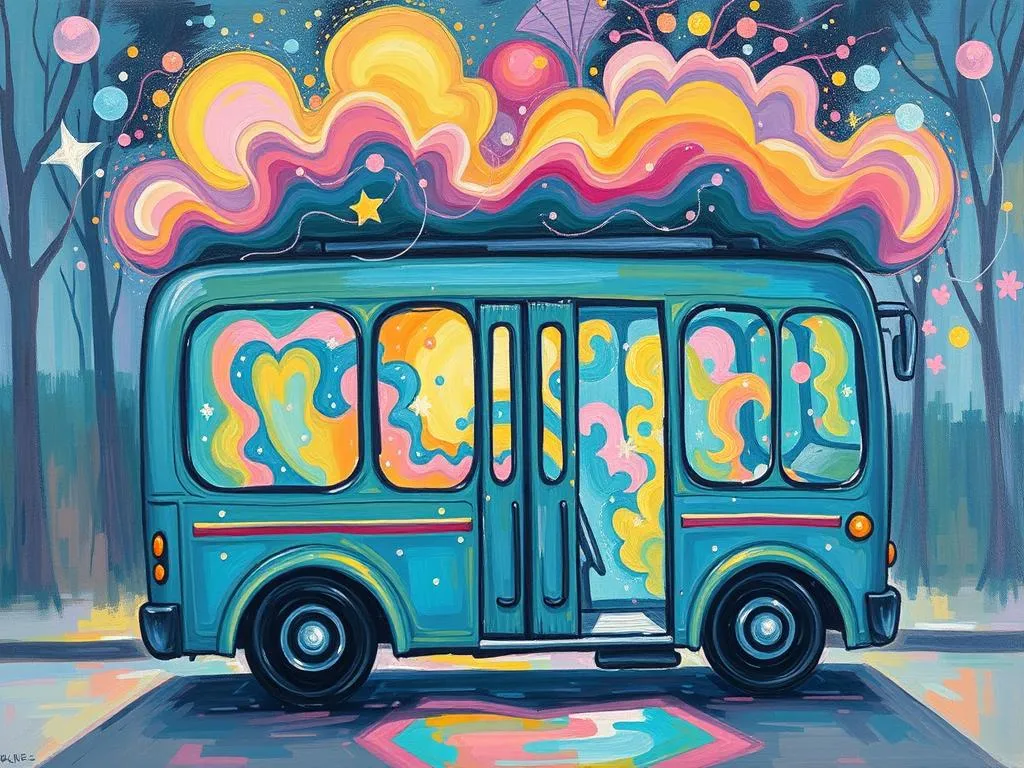
Introduction
Dreams have long been a source of fascination and intrigue, offering a glimpse into our subconscious minds. Among these, dreams involving bus stops often evoke a range of emotions and interpretations. They can symbolize transitions, waiting periods, or the feeling of being at a crossroads in life. Understanding the significance of bus stops in dreams can provide valuable insights into our waking experiences and emotional states. This article delves into the hidden meanings behind bus stops in dreams, exploring their symbolism, various scenarios, and how we can relate these dreams to our real-life situations.
Symbolism and Meaning
Bus stops in dreams often symbolize transitions or moments of pause in our lives. They represent a temporary space where we wait for something to happen, mirroring our feelings of anticipation or uncertainty about future changes. The bus itself can symbolize a journey—one that may be physical, emotional, or spiritual. The nature of the bus, whether it is crowded or empty, can further influence the dream’s meaning.
From a psychological perspective, bus stops can signify a period of reflection. Just as we wait at a bus stop, we may find ourselves in a phase of our lives where we are contemplating our next moves. This could relate to career choices, relationships, or personal growth. The waiting at a bus stop embodies our desire for transition—waiting for the right opportunity or moment to arrive.
Additionally, bus stops can represent social connections. They are places where people come together, often sharing brief interactions. In this light, dreaming of a bus stop may prompt you to consider your relationships. Are you feeling connected or isolated? Are you waiting for someone to join you on your journey?
Key Scenarios and Variations
The meaning of bus stop dreams can vary greatly depending on the specific scenarios presented. For instance, dreaming of missing a bus can evoke feelings of regret or anxiety about missed opportunities. This scenario might indicate that you are feeling overwhelmed in your waking life, struggling to keep up with demands or feeling as though you are falling behind.
Conversely, if you dream of waiting patiently at a bus stop, it may suggest that you are in a period of acceptance. You might be acknowledging that some things take time to materialize, and you are prepared to be patient while you await your next steps. This dream can signify a sense of peace with your current situation, even if it feels stagnant.
Another common scenario involves boarding a bus. This can symbolize taking a decisive step forward in your life. If you feel excited about boarding the bus, it may indicate readiness for change and adventure. However, if you feel anxious or uncertain, it could suggest hesitance or fear about the journey ahead.
Dreams of arriving at a bus stop can also carry significance. This could symbolize the arrival of new opportunities or the culmination of a journey. It might indicate that you are reaching a point of understanding or enlightenment about a situation in your life. Reflecting on how you feel during this arrival can provide further insights into your current mindset.
Lastly, the location of the bus stop can influence its meaning. A familiar bus stop may represent comfort and routine, while an unfamiliar one might highlight feelings of insecurity or fear of the unknown. The emotional atmosphere surrounding the bus stop—whether it is bustling and vibrant or quiet and desolate—can also affect the interpretation. A crowded bus stop may symbolize feeling overwhelmed by social obligations or a busy lifestyle, while a deserted one could reflect feelings of loneliness or isolation.
Real-Life Connections and Takeaways
Reflecting on dreams involving bus stops can lead to profound insights about our waking lives. They often serve as a mirror, reflecting our feelings about transitions, relationships, and personal growth. To connect your dream to real-life situations, consider your current circumstances and emotional state. Are you at a crossroads? Are you waiting for something significant to happen?
It may be helpful to engage in self-reflection after experiencing a dream about bus stops. Journaling can be an effective way to process your thoughts and feelings. Write down the details of the dream, including your emotions and any symbols that stood out. Explore how these elements relate to your life. This practice can lead to greater self-awareness and clarity about your personal journey.
Additionally, consider how your relationships are influencing your experiences. Are there connections that feel supportive, or are there aspects of your social life that need reevaluation? Dreams about bus stops can prompt you to assess whether you are surrounding yourself with people who uplift and inspire you or if you are feeling stagnant due to unhealthy dynamics.
Practicing mindfulness can also help you navigate the feelings of uncertainty associated with these dreams. Being present in the moment allows you to explore your feelings without judgment, enabling you to approach transitions with greater ease. When faced with decisions or changes, take the time to sit with your emotions and consider what feels right for you.
Lastly, embrace the idea of patience. Just as waiting at a bus stop can feel tedious, life transitions often require a period of waiting. Learning to accept this waiting period can lead to personal growth and understanding. Instead of rushing into the next phase, allow yourself the time to reflect and prepare for what lies ahead.
In conclusion, dreams featuring bus stops carry rich symbolism, reflecting our inner thoughts, feelings, and external circumstances. By unraveling their meanings, we can gain insights into our waking lives, guiding us through transitions and helping us navigate relationships. Engaging in self-reflection and mindfulness can enhance our understanding of these dreams, allowing us to embrace the journey ahead with confidence and clarity. As you explore your dreams, remember to approach them with an open mind and a willingness to learn from your subconscious.







